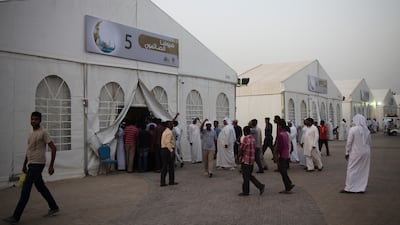The UAE has announced the return of iftar tents during Ramadan for the first time since the start of the Covid-19 pandemic.
The marquees have been cancelled for the past two years to prevent gatherings and limit the spread of the coronavirus.
On Monday, the National Emergency Crisis and Disasters Management Authority said the tents would be reinstated.
“This comes in line with the national strategy to maintain public health and safety in light of the resumption of various public activities, and in support of the tireless efforts made at the country level to achieve sustainable recovery and restore normalcy,” it told Wam.
Ramadan is expected to begin on April 2, but the start date is to be confirmed by the UAE’s moon-sighting committee.
Prior to the pandemic, large tents were typically erected next to mosques and often provided meals to low-income workers.
In 2020, charitable organisations delivered iftar dishes directly to those in need rather than at tents or at mosques.
The change was made necessary to avoid mass gatherings.
NCEMA set out a number of Covid-19 safety measures for the operation of the tents:
- A green pass on Al Hosn app will be required to enter
- Approval will be required from Emirates Red Crescent to set up a tent
- Each emirate will consult with its local Emergency Crisis and Disaster Management Authority to decide occupancy levels
- Social distancing of one metre must be maintained
- Masks must be worn
- Tents may open two hours before iftar
- Organisers are to provide masks and disinfectant and to direct people to follow all precautionary and preventive measures, including mask-wearing, physical distancing and frequent hand sterilisation.
- Open-air tents to be used
- Using disposable table covers is mandatory, with disposable plates, cups and spoons recommended
The move comes amid a sharp drop in Covid-19 cases in recent weeks.
On Monday, the UAE reported 296 new coronavirus cases, the lowest daily tally in 12 weeks.
Daily figures had exceeded 3,000 as recently as January.
Authorities have eased Covid-19 restrictions in line with a cautious recovery from the pandemic.
The wearing of masks outdoors is now optional outdoors, although such face coverings remain mandatory in indoor settings.
Last month, Abu Dhabi lifted Covid-19 border controls on entry to the capital from other emirates.
The emirate’s Emergency, Crisis and Disaster Management Committee said Al Hosn green pass would no longer be required.
EDE scanners were also removed from checkpoints for commuters.
The green pass system will still be needed to gain access to public buildings in Abu Dhabi.


















